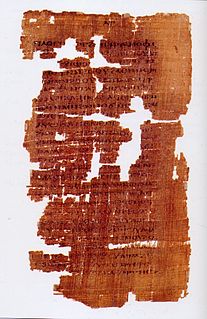
In religion, divinity or Godhead is the state of things that are believed to come from a supernatural power or deity, such as God, the supreme being, creator deity, or spirits, and are therefore regarded as sacred and holy.
Such things are regarded as divine due to their transcendental origins or because their attributes or qualities are superior or supreme relative to things of the Earth. Divine things are regarded as eternal and based in truth, while material things are regarded as ephemeral and based in illusion. Such things that may qualify as divine are apparitions, visions, prophecies, miracles, and in some views also the soul, or more general things like resurrection, immortality, grace, and salvation. Otherwise what is or is not divine may be loosely defined, as it is used by different belief systems.

The Book of Deuteronomy is the fifth book of the Christian Old Testament and of the Jewish Torah, where it is called "Devarim".

The divine right of kings, divine right, or God's mandate is a political and religious doctrine of royal and political legitimacy. It asserts that a monarch is subject to no earthly authority, deriving the right to rule directly from the will of God. The king is thus not subject to the will of his people, the aristocracy, or any other estate of the realm. It implies that only God can judge an unjust king and that any attempt to depose, dethrone or restrict his powers runs contrary to the will of God and may constitute a sacrilegious act. It is often expressed in the phrase "by the Grace of God", attached to the titles of a reigning monarch.

Lucifer is a Latin name for the planet Venus as the morning star in the ancient Roman era, and is often used for mythological and religious figures associated with the planet. Due to the unique movements and discontinuous appearances of Venus in the sky, mythology surrounding these figures often involved a fall from the heavens to earth or the underworld. Interpretations of a similar term in the Hebrew Bible, translated in the King James Version as "Lucifer", led to a Christian tradition of applying the name Lucifer and its associated stories of a fall from heaven to Satan. Most modern scholarship regards these interpretations as questionable, and translates the term in the relevant Bible passage as "morning star" or "shining one" rather than as a proper name, "Lucifer".

According to a hadith, there are at least 99 Attributes of Allah, known as the ʾasmāʾu llāhi l-ḥusnā. The names are also called 99 Attributes of Allah.
Emperor or Huangdi was the imperial title of the Chinese sovereign from 221 BCE to the early 20th century. It was established by Qin Shi Huang, the First Emperor, after the reunification of the lands of the Zhou dynasty. It replaced the Zhou's own title of wáng ("king"), which had been appropriated by numerous warlords during the Warring States Era. The Chinese title is not grammatically gendered, but the only empress to bear it was Wu Zetian, who briefly replaced the Tang dynasty with her own in the years 690–705 CE. Use of the title is considered to have officially ended with the abdication of Puyi in 1912 following the Xinhai Revolution and the establishment of the Republic of China, although there were two failed attempts to reestablish an imperial government in China in 1915 and 1917.

The Emirate of Transjordan, officially known as the Amirate of Trans-Jordan, was a British protectorate established in April 1921.

The Shepherd of Hermas is a Christian literary work of the late first half of the second century, considered a valuable book by many Christians, and considered canonical scripture by some of the early Church fathers such as Irenaeus. The Shepherd was very popular amongst Christians in the 2nd and 3rd centuries. It is part of the Codex Sinaiticus, and it is listed between the Acts of the Apostles and the Acts of Paul in the stichometrical list of the Codex Claromontanus.

The Mandate of Heaven or Tian Ming is a Chinese political and religious doctrine used since ancient times to justify the rule of the King or Emperor of China. According to this belief, heaven —which embodies the natural order and will of the universe—bestows the mandate on a just ruler of China, the "Son of Heaven" of the "Celestial Empire". If a ruler was overthrown, this was interpreted as an indication that the ruler was unworthy, and had lost the mandate. It was also a common belief among citizens that natural disasters such as famine and flood were signs of heaven's displeasure with the ruler, so there would often be revolts following major disasters as citizens saw these as signs that the Mandate of Heaven had been withdrawn.
In religion, a blessing is the infusion of something with holiness, spiritual redemption, or divine will.

The Genesis creation narrative is the creation myth of both Judaism and Christianity. The narrative is made up of two stories, roughly equivalent to the first two chapters of the Book of Genesis. In the first, Elohim creates the heavens and the Earth in six days, then rests on, blesses and sanctifies the seventh. In the second story, God, now referred to by the personal name Yahweh, creates Adam, the first man, from dust and places him in the Garden of Eden, where he is given dominion over the animals. Eve, the first woman, is created from Adam and as his companion.

The cultural mandate or creation mandate is the divine injunction found in Genesis 1:28, in which God (YHWH), after having created the world and all in it, ascribes to humankind the tasks of filling, subduing, and ruling over the earth.
In Judaism, a Chillul Hashem is an act that violates the prohibition in the Torah of desecrating (chillul) the name (Hashem) of God. A Chillul Hashem occurs when a Jew acts immorally while in the presence of others, either Jews or Gentiles. Since Judaism believes that Jews are representatives of God and His moral code, when a Jew acts in a shameful manner, s/he has represented God poorly, thus desecrating His name. Chillul Hashem is the opposite of a Kiddush Hashem — the act of bringing honor, respect, and glory to God's name. Kiddush Hashem is often used to mean religious martyrdom. The concept of Chillul Hashem is prevalent in the Bible, and is often referenced by modern-day Jews as a reason to uphold the highest moral standard, especially as it pertains to the State of Israel.
Christian libertarianism is the synthesis of Christian beliefs concerning free will, human nature, and God-given inalienable rights with libertarian political philosophy.

The Lonely Man of Faith is a philosophical essay written by Rabbi Joseph B. Soloveitchik, first published in the summer 1965 issue of Tradition, and published in a newly revised edition in 2011 by Koren Publishers Jerusalem.

The Land of Israel is the traditional Jewish name for an area of indefinite geographical extension in the Southern Levant. Related biblical, religious and historical English terms include the Land of Canaan, the Promised Land, the Holy Land, and Palestine. The definitions of the limits of this territory vary between passages in the Hebrew Bible, with specific mentions in Genesis 15, Exodus 23, Numbers 34 and Ezekiel 47. Nine times elsewhere in the Bible, the settled land is referred as "from Dan to Beersheba", and three times it is referred as "from the entrance of Hamath unto the brook of Egypt”.
The Mandatory Palestine national football team represented the British Mandate of Palestine in international football competitions and was managed by the Eretz Israel Football Association.
Papyrus 129, designated by
129, is a papyrus manuscript of part of The Shepherd of Hermas apocrypha, in Greek. It contains chapters 51.8 through 82.1 of The Shepherd of Hermas, a section which contains the fifth vision, and the ten parables. The manuscript has been assigned to the mid-3rd century AD. The papyrus is currently held at the University of Michigan.













